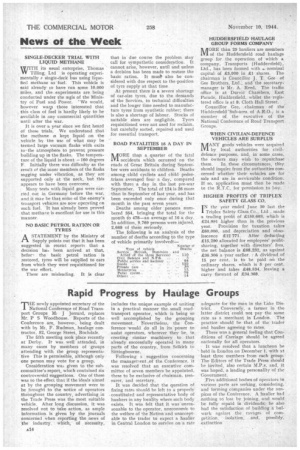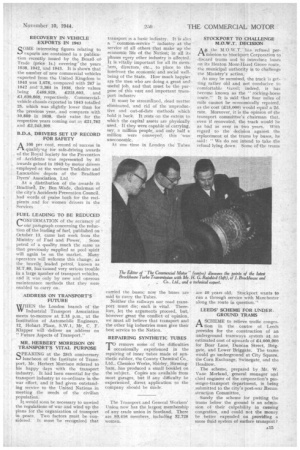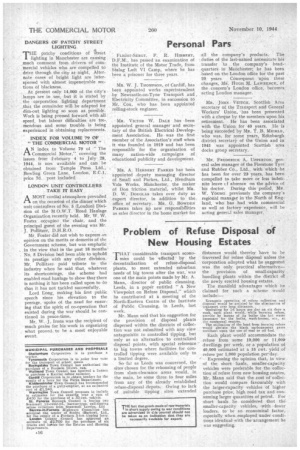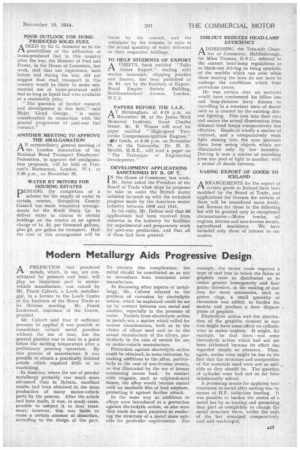News of the Week
Page 16

Page 17

Page 18

Page 19

If you've noticed an error in this article please click here to report it so we can fix it.
SINGLE-DECKER TRIAL WITH LIQUID METHANE WITH its usual enterprise, Thomas VV Tilling, Ltd is operating experimentally e single-deck bus using liquefied methane as fuel. This vehicle is said already to have run spme 10,000 miles, and the experiments are being conducted under the mgis of the Ministry of Fuel and Power. 'We would, however wars those interested that . this class of fuel is hardly likely to be available in any commercial quantities until after the war.
It is over a year since we first heard of these trials. We understand that the methane is kept liquid on the vehicle be the use of what may be termed large vacuum flasks with exits to-the atmosphere to prevent pressure building up in the flasks. The temperature of the liquid is about —160 degrees F. Initially there was difficulty as the result ot the inner members of the flasks sagging under vibration, as they are supported only at the neck, but this appears to have been overcome. . Many tests with liquid gas were carried out in Germany before the war. and it may be that some of the enemy's transport vehicles are now operating on such fuel. It has already been proved that methane is excellent for use in this manner.
NO BASIC PETROL RATION OR . TYRES
1-1 A STATEMENT by the Ministry of Supply points out that it has been suggested in recent reports that a decision has been arrived at that, befors the basic petrol ration is restored, tyres will be supplied to cars from which they were requisitioned for the war effort.
These are misleading. It is clear that in due course the problem May call for sympathetic consideration. It cannot arise, however, until and unless a decision has been made to restore the basic ration. It muse also be considered with due respect to the-positioa of tyre supply at that time. At present there is a severe shortage of car-size tyres, due to the demands of the Services, to technical difficulties and the longer time needed to manufacture" tyres from synthetic rubber; there is also a shortage of labour. Stocks of suitable sizes are negligible. Tyres requisitioned were not used for reclaim, but carefully sorted, repaired and used for essential transport.
ROAD FATALITIES 16 A DAY IN SEPTEMBER 1% ACME than a quarter of the fatal 1VI. accidents which occurred on the roads of Great Britain during Seotemher were accidents to children. Deaths among child cyclists and child pedestrians averaged four a day, compared with three a day in the last pre-war September. The total of 124 is 26 more than in September of last year, and has been exceeded only once during that month in the past seven years. Deaths among older persons numbered 354, bringing the total for the month .eo 478—an average of 16 a day. In addition, 9,769 persons were injured, 2,668 of them seriously.
The following is an analysis of the number of deaths according to the type of vehicle primarily involved—
HUDDERSFIELD HAULAGE GROUP FORMS COMPANY.
rt AORE than 25 hauliers are members 1V1 of the Huddersfield road haulage group for the operation of which a company, Transports (Huddersfield), Ltd., has been formed with nominal capital of £5,000 in £1 shares, The chairman is Councillor J. T. Gee of Gee Brothers, Ltd., and the secretarymanager is Mr. A. Reed. The traffic office is at Durvic Chambers, East Parade, Huddersfield, whilst the registered office is at 8, Cloth Hall Street.
Councillor Gee, chairman of the Huddersfield' Sub-area of A.R.O., is a member of the executive of the National Conference of Road Transport Groups.
WHEN CIVILIAN-DEFENCE VEHICLES ARE SURPLUS lkaANY goods vehicles were acquired 1V1 by local authorities for civildefence purposes, and, in some cases, the owners may wish to repurchase them. In these circumstances, they should inquire from the authorities concerned whether their vehicles are for sale and are in serviceable condition. If so, application must then be made to the R.T.C. for permission to buy.
HIGHER PROFITS OF TRIPLEX SAFETY GLASS CO, I N the year ended June 30 last the Triplex Safety Glass Co.. Ltd , made a trading profit of £150,603, which is £24,991 higher than in the previous year • Provision for taxation takes £60,000, and depreciation and obso lescence £12 771, After deducting £15,290 allocated for employees' profitsharing, together with directors' fees, the net balance is £68,232, as against £36,306 a year earlier, • A dividend of 15 per cent, is to be paid on the ordinary shares, which is 5 per cent. higher and takes £48,534, leaving a carry forward of £34,368. RECOVERY IN VEHICLE EXPORTS IN 1943
SOME interesting figures relating to exports are contained in a publication recently issued by the Board of. Trade (price is.) covering the years 1938, 1942, and 1943. It is shown that the number of new commercial vehicles exported from the United Kingdom in 1943 was 1.078, compared with 267 in 1942 and 3,384 in 1938, their values being £488,929, £225,603, and £1,639,868, respectively. Commercialvehicle chassis exported in 1943 totalled 25. which was slightly lower than for the previous year, and compares with 10,889 in 1938, their value for the respective years coming out at £21,782 and £2,243,309.
B.D.A. DRIVERS SET UP RECORD FOR SAFETY
A100 per cent, record of success in qualifrng for safe-driving awards of the Royal Society for the Prevention of Accidents was represented by HI awards gained in 1943 by motor drivers employed at the various Yorkshire and Lancashire depots of the Bradford Dyers' Association, Ltd, At a distribution of the awards ih -Bradfora, Dr. Ben Wade, chairman of the city's Accidents Prevention Council, had words of praise both for the recipients and for women drivers in the Services
FUEL LEADING TO BE REDUCED
rONFIRMATION of the accuracy of our paragraph concerning the reduction of the leading of fuel, published on October 13, came last week from the Ministry of Fuel and Power, Soon petrol of a quality much the same as that previously supplied as pool spirit will again be on the market. Many operators will welcome this change, as the heavily. leaded petrol, known as M.T.80, has caused very serious trouble in a large n,umber of transport vehicles, and it was only by new and onerous maintenance methods that they were enabled to carry on.
ADDRESS ON TRANSPORT'S FUTURE WHEN the London branch of the W Industrial Transport Association meets to-morrow at 2.15 p.m., at the Institution of Automobile Engineers. 12, Hobart Place, S.W.1, Mr, C. F. Klapper will deliver an address on " Future Aspects of Transport."
MR. HERBERT MORRISON ON TRANSPORT'S VITAL PURPOSE
QPEAKING at the 25th anniversary a..) luncheon of the Institute of Transport, Mr. Herbert Morrison referred to his happy days with the transport industry. It had been essential for the transport industry to co-ordinate in the war effort, and it had given outstanding service to the United Nations in meeting the needs of the civilian population.
It would soon be necessary to unwind the regulations of war and wind up the plans for the organization of transport in peace. Two factors must be considered. It must be recognized that transport is a basic industry. It is also a " common-service " industry at the service of all others that make up the economic life of the Nation; in all its phases eery other industry is affected. It is vitally important for all its Members, directors, etc., to place to the forefront the economic and social wellbeing of the State. How much happier are the men who are doing a great and useful job, and that must be the purpose of this vast and important transport industry It must be streamlined, dead matter eliminated, and rid of the unproductive and out-of-date methods which hold it back. It rests on the extent to which the capital assets are physically used. If they were capable of carrying, say, a million people, and only half a million were conveyed, this 'was uneconomic.
At one time in London the Tubes carried the buses; now the buses are said to carry the Tubes.
Neither the railways nor road transport must die; each, is vital. Therefore, let the arguments proceed, but, however great the conflict of opinion, we must all believe that transport and the other big industries must give their best service to the Nation.
REPAIRING SYNTHETIC TUBES
erremove some of the difficulties occasionally experienced in the repairing of inner tubes made of synthetic rubber, the County Chemical Co., Ltd., Chemico Works, Shirley, Birmingham, has produced a small booklet on the subject. Copies are available from most garages, but if any difficulty be experienced, direct application to the company should be made.
The Transport and General Workers' Union now has the largest membership of any trade union in Scotland. There are 93,416 members, including 32,728 women. STOCKPORT TO CHALLENGE M.O.W.T. DECISION
A' the M.O.W.T. has refused permission to Stockport Corporation to discard trains and to introduce buses on its Heaton Moor-Hazel Grove route, the municipal authority is to challenge the Ministry's action.
As may be surmised, the track "is getting rather old and not conducive to comfortablo (ravel; indeed, it has become known as the " rocking-horse route." It is said that four miles of rails cannot be economically repaired, as the cost (A15,000) would equal a 2d. rate. Moreover, it is the opinion of the transport committee's chairman that, even if renovated, the track would be as had as ever in two years. With regard to the decision against the replacement of the trams by buses, he said:" We do not intend to take the refusal lying down. Some of the trains are 40 years old. Stockport wants to run a through service with Manchester along the route in question."
LEEDS' SCHEME FOR UNDERGROUND TRAMS ASCHEME to relieve traffic congestion in the centre of Leeds provides for the construction of an underground tramways system at an estimated cost of upwards of £4,000,000 for Boar Lane, Duncan Street, Briggate, and Lower Briggate. The trams would go underground at City Square, the Corn Exchange, Swinegate, and the Fleadrow.
The scheme, prepared by Mr. W. Vane Morland, general manager and chief engineer of the corporation's passenger-transport department, is being submitted to the city's post-war Reconstruction Committee.
Surely the scheme for putting the trams below the ground is an admission of their culpability in causing congestion, and could not the money be better expended on providing a more fluid system of surface transport ? DANGERS OF PATCHY STREET LIGHTING
THEpatchy conditions of treet lighting in Manchester are causing much comment from drivers of commercial vehicles who are compelled to drive through the city at night. Alternate oases of bright light are interspersed with almost impenetrable sections of blackness.
At present only 14.000 of the city's lamps are in use, but it is stated by the corporation lighting department .that the remainder will be adapted for dim-out lighting so soon as possible. Work is being pressed forward with all speed, but labour difficulties are tremendous and some trouble is being experienced in obtaining replacements.
INDEX FOR VOLUME 79 OF "THE COMMERCIAL MOTOR"
AN index to Volume 79 of " The Commercial Motor," covering the issues from February 4 to July 28, 1944, is non available and can he obtained from 'Temple Press Ltd., Bowling Green Lane, London. E.C.L price 7d. post included.
LONDON UNIT CONTROLLERS TAKE IT EASY
AMOST cordial atmosphere prevailed on the occasion of the dinner which unit controllers of No. 5 (London) Division of the M 0.W.T. Road Haulage Organization recently held. Mr, W. W, Fostet occupied the chair, and the principal guest of the evening was Mr. J. Pollitzer, D.H.R.O.
Mr, Foster did not wish to express an opinion on the merits or demerits of the Government scheme, hut was emphatic , in the view that in the past 18 months' No. 5 Division had been able to uphold its prestige with any other division. Mr. Pollitzerpaid tribute to the industry when he said that, whatever its shortcomings, the scheme had enabled road haulage to show that there is nothing it has been called upon to do that it has not tackled successfully.
Lord Long, making his first public speech since his elevation to the peerage, spoke of the need for ensuring that the spirit of co-operation that existed during the war should be continued in peace-time.
Mr. W. J. Irons was the recipient of much praise for his work in organizing what proved to be a most enjoyable event. POOR OUTLOOK FOR HOMEPRODUCED SOLID FUEL
A SKED by Sir G. Schuster as td the
possibilities of the utilization of home-produced fuel in this country after the war, the Minister of Fuel and Power, in the House of Commons, last week, said that our experience, both before and during the war, did not suggest that road transport in this country would be likely to make substantial use of home-produced solid fuel so long as liquid fuel were available at a reasonable price.
" The question of further research and development in this field." said Major Lloyd George, " is under consideration in connection with the general programme of post-war fuel research."
ANOTHER MEETING TO APPROVE THE AMALGAMATION
AN extraordinary general meeting of the London Association of the National Road Transport Employers' Federation, to approve th4 amalgamation proposals, will be held at Frascati's Restaurant, London, W.1, at 2.30 p.m., on November 29.
WATER BY MOTORS FOR HOUSING ESTATES
PENDING the completion of a scheme for the supply of water to certain estates, Shropshire. County Council has made temporary arrangements for the Kraft Dairy Cp. to deliver water in churns to certain holdings on the estates at an agreed charge of Is. 3d. per thousand gallons, plus /d. per gallon for transport. Half the cost of this arrangement will be
borne by the council, and the remaiader by the tenants, in ratio to the actual quantity of water delivered to their respective holdings.
TO HELP STUDENTS OF EXPORT A USEFUL book entitled "Talks A About Export," dealing with marine insurance, shipping practice and finance, has been published at 2s. 6d. net by the Institute of Export, Royal Empire Society Building. Northumberland Avenue, London, W.C.2.
PAPERS BEFORE THE I.A.E.
ATBirmingham, at 6.15 p.m. on November 28, at the James Watt Memorial Institute, Great Charles Street, Mr. R. Wisner will read his paper entitled " High-speed Twostroke Compression-ignition Engines." 4IAt Leeds, at 6.30 pin, on November 29, at the University, Dr. H. E. Merritt, M.B.E., will read a paper on " The Technique of Engineering Development."
DEVELOPMENT APPLICATIONS SANCTIONED BY B. OF T.
I N the House of Commons, last week, Mr. Astor asked the President of the Board of Trade what steps he proposes to take to assist the British motor industry to catch up with the technical progress made by the American motor industry between 1939 and 1941.
In his reply, Mr. Dalton said that 56 applications had been received from concerns in the industry for facilities for experimental and preparatory work for post-war production, and that all of them had been granted, DIM-OUT REDUCES HEAD-LAMP EFFICIENCY
ADDRESSING the Tees-side Chamber of ,Commerce, Middlesbrough, Sir Miles Thomas, D.F.C., referred to -the current head-lamp regulations as to black-out driving as being symbolic of the muddle which can arise when those making the laws do not have to undergo the conditions which their provisions create.
He was certain . that no motorist would have condemned his fellow bus and long-distance lorry drivers to travelling in a constant state of dazzle such as is created by the existing dimout lighting. This cuts into their eyes and makes the actual illumination from dimmed head lamps comparatively lees effective. Dazzle is wholly a matter of contrast, and a comparatively weak light shining into the eyes prevents them from seeing objects which are illuminated only by low intensity. Driving is now a matter of travelling from one pool of light to another, with a period of dazzle between.
EASING EXPORT OF GOODS TO ICELAND
A RRANGEMENTS for the export of
certain goods to Iceland have been modified by the Board of Trade, and applications for licences for certain of them will be considered more freely, but licences for those in the following list will be granted only in exceptional circumstances:—Motor trucks, oil engines, ferrous and non-ferrous metals, . agricultural machinery. We have included only those of interest to our readers.




















































